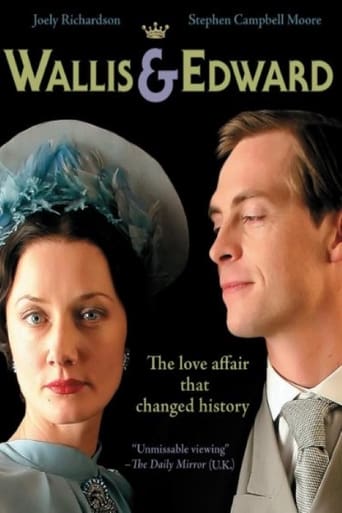CommentsXp
Best movie ever!
Borgarkeri
A bit overrated, but still an amazing film
Glucedee
It's hard to see any effort in the film. There's no comedy to speak of, no real drama and, worst of all.
Aubrey Hackett
While it is a pity that the story wasn't told with more visual finesse, this is trivial compared to our real-world problems. It takes a good movie to put that into perspective.
norman201057
One can only describe this rubbish as, well rubbish, the writer must have been a relative of Mrs. Simpson to write this drama in such a fashion. I note the decimation of Balomoral Castle was omitted, it would have been called sacking in days of old, but she cleaned out a few rooms, mind you stripping rooms was mild by her other favourite hobby, jewel collecting. Then we have them doing what could be called a state visit to the Nazi party, I thought only the head of state carried out official state visits, and what about the deal they both did with Hitler to put him on the throne as king and her as Queen is Hitler had invaded Britain. What about them dining with Nazis in Portugal while the British Government were trying to get them away from possible Nazi capture, they tried every way possible to get captured. Then we have them as governor of the Bahamas during the war, and hating every day of the post, because the residence was not big enough for their needs, and not enough servants allocated. This was pure and simply a load of rubbish, if the author had went for the truth instead of complete fiction, it might have made it even slightly less boring, but I decided to watch to the end, oh how I wish I'd turned it off after the credits at the start It was an exercise in nothing, as it was no where near to the truth, the only part that was remotely truthful was the abdication speech, well done to the author for that.
jotix100
As biopic films go, this one has taken a lot of liberties in order to produce an entertainment that will be appreciated by people that didn't know many of the details which surrounded the abdication of the heir of the English throne in the 1930s. Written by Sarah Williams and directed by without much excitement by Dave Moore, we are given an account of what went on behind the scenes in one of the most remarkable stories of the last century.Edward, who would have been the king of England after the death of his father, has to do some reckoning about whether to give up the reins to the empire in order to marry the woman who conquered his heart. This was one of the most romantic episodes involving a royal house in Europe in the last century. Duty, honor, something that is a natural for the monarchy of that country, was a burden Edward was not ready to accept because it excluded the twice-divorced Wallis Simpson, who he fell in love with and put him at odds with his family and the English establishment, something unheard of in those days.The result was his abdication and a life without his family, who protocol dictated to stay away from him after the scandal. Edward and Wallis lived the jet set life of the few privileged people of the times after he resigned the right to be crowned king. The film only deals with the events that led to that break.Joely Richardson shows an uncanny resemblance to Wallis Simpson, a woman with her own style who made headlines and who appeared to have lived a fulfilled life next to the man who gave up everything for her. Stephen Campbell Moore is seen as Edward. Mr. Campbell Moore makes a good impression as this somewhat rash young man who couldn't care anything about the power his position would have meant for him. He was an unselfish man who threw everything away for love.Mr. Moore got interesting performances from the supporting cast, especially Richard Johnson, as Stanley Baldwin, the man who opposed the marriage from the start. David Calder is seen as Winston Churchill, who proved to be a true friend to the troubled monarch. The excellent Margaret Tyzak, who has little to do, appears as a proud Queen Mary.This film, although far from accurate, shows a page of history from the not too distant past in which we are shown a different situation of the royal family of England, something that in today's standards wouldn't have occurred at all.
Philby-3
Viewers with an interest in British history might wish to note that since the first Hanoverian came to the British throne (George I in 1714) it has been occupied by dimwits. These dimwits have fallen into two classes – those like Victoria, George V, George VI and the present incumbent, who saw themselves as the slaves of duty and therefore as ceremonial heads of state did little or no harm, and those like George IV, Edward VII and Edward VIII who kicked over the traces, but did less damage than one might have expected. The 1936 abdication crisis was a crisis only for those who believe in monarchy, in this country a minority of about 25%, according to the 1999 Republic referendum. The story has been told several times before on TV – is there anything new about this 2005 ITV version, apart from the Baltic locations?.Well, the publicity says there's more of Wallis's side of the story here, but I can't say that's obvious, apart from there being a bit more of Wallis' Aunt Bessie (Miriam Margolyes). Edward is portrayed as the seducer (in a candlelight chalet in winter) but Wallis (nicely played by Joely Richardson) doesn't exactly play hard to get. She had rivals for the post of prince's mistress (Lady Furness and Mrs Ward) whom she easily defeats. At the end she was left with the baby, or at least the immature prince, a duchess without honour exiled to France. Stephen Campbell Moore is about 10 years too young for Edward but his puppy-like demeanour is appropriate. The triviality of the Windsors is shown by the fact that it wasn't the loss of the Crown that irked them so much as the establishment's refusal to give Wallis the title "Her Royal Highness". Diana, of course, had exactly the same beef, but then she was demoted on her divorce. Camilla (for the moment) is a mere duchess, but is also "HRH". Winston Churchill, robustly played here by David Calder, was a principal supporter of Edward just because he was a prince, but then Winston was a rather romantic old Tory.Nazi sympathies were not uncommon in the British upper classes prior to World War 2 ("those Nazi chappies certainly know how to make the trains run on time") but if an invasion of Britain by Germany had been successful (and it was a close–run thing), Edward, given his sympathies would have been the front-runner for puppet King. Edward was an undistinguished governor of the Bahamas between 1940 and 1945 but the main reason for that appointment was to keep him out of the reach of the Nazis. (Down under we got his younger brother, Prince Henry, who was even dumber than Edward, as GG (1942-1945), but a bit better behaved). After that he and Wallis spent the remaining 27 years of their marriage in very comfortable and well-deserved obscurity in Paris. One is left with the feeling we got lucky.This production has a nice sheen to it and the 30s' era is well evoked. There are some other good performances, particularly 80 year old veteran Richard Johnston as Wallis' nemesis, prime minister Baldwin, and Julian Wadham as Edward's not exactly loyal private secretary Fitzhardinge.
eduncan-1
Unfortunately, the show contains quite a few inaccuracies: Ernest Simpson is portrayed as an American; he was English; the Simpsons' friend Mary was used in the film as the adultery partner for the divorce when it was simply a woman hired for the occasion, Edward is referred to as 'the king' before he was the king, Mrs. Simpson and the king are shown together after her divorce decree nisi was granted when in fact she left the country immediately as any hint of collusion with Edward might have meant the decree would not be granted. Aunt Bessie says 'He might have done' when as an American she would have said "He might have" .... the list goes on. I think filmmakers have a responsibility if they take on a historical drama when the facts are well know, to get it right.

